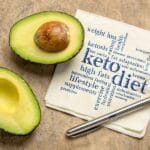Pregnancy is a time when women are more conscious of their health and diet than ever. With so many diets out there, one that has gained significant attention is the ketogenic or keto diet. The keto diet, known for its high-fat, low-carb approach, has shown promise in weight loss, improved energy levels, and better blood sugar control. But when it comes to pregnancy, the big question is: is it safe? Let’s explore the keto diet during pregnancy, its safety, potential benefits, and what expecting mothers need to consider.
What is the Keto Diet?
The ketogenic diet is a high-fat, low-carbohydrate, and moderate-protein diet that encourages the body to enter a state called ketosis. In ketosis, the body burns fat for energy instead of carbohydrates. The typical macronutrient breakdown is about 70-75% fat, 20-25% protein, and 5-10% carbohydrates. This drastic reduction in carbohydrates forces the body to use fat as its primary energy source, which can lead to weight loss and other health benefits.
The Keto Diet and Pregnancy: Understanding the Basics
During pregnancy, a woman’s body requires more nutrients and energy to support the growing fetus. Traditionally, carbohydrates have been considered essential for fetal development because they are a primary energy source. However, the keto diet limits carb intake, which raises concerns about whether it provides sufficient nutrients for both mother and baby.
Key Nutritional Needs During Pregnancy
Pregnant women need more of certain nutrients, including:
- Folic Acid: Essential for fetal brain and spinal cord development.
- Iron: Necessary for increasing blood volume and preventing anemia.
- Calcium: Important for developing strong bones and teeth.
- Omega-3 Fatty Acids: Crucial for fetal brain development.
- Protein: Helps in the growth of fetal tissues, including the brain.
The keto diet, if not planned carefully, might lack these crucial nutrients, making it potentially unsafe if not managed properly.
Is the Keto Diet Safe During Pregnancy?
The safety of the keto diet during pregnancy is a topic of debate. Most healthcare providers advise against following a strict keto diet during pregnancy due to potential risks, including nutrient deficiencies. Here’s why:
1. Potential Nutrient Deficiencies
- A keto diet can lead to a deficiency in essential vitamins and minerals like folic acid, which is crucial in preventing neural tube defects in the baby.
- Limited fruit and vegetable intake can reduce antioxidant levels, which are important for reducing inflammation and promoting fetal health.
2. Ketosis and Pregnancy
- Ketosis itself is not necessarily harmful, but during pregnancy, the metabolic demands increase. There are concerns about how ketosis might affect fetal development, particularly brain growth.
- The body’s ketone levels should be carefully monitored to avoid excessively high levels, which could be risky.
3. Insufficient Research
- There is limited research on the long-term effects of the keto diet on pregnant women and their babies. Most available studies are animal-based or involve a small number of human subjects, making it difficult to draw definitive conclusions.
4. Higher Risk of Gestational Diabetes
- The keto diet could potentially reduce the risk of gestational diabetes by stabilizing blood sugar levels. However, a very restrictive diet could also lead to low blood sugar episodes, which are dangerous for both mother and baby.
Potential Benefits of the Keto Diet During Pregnancy
While there are risks, some potential benefits could be considered if the diet is well-balanced and monitored by a healthcare professional:
1. Improved Blood Sugar Control
- The keto diet can help stabilize blood sugar levels, which may be beneficial for pregnant women at risk of gestational diabetes.
2. Healthy Weight Management
- The keto diet can help in managing weight gain during pregnancy, which is important as excessive weight gain can lead to complications such as preeclampsia, gestational diabetes, and the need for a cesarean section.
3. Reduced Inflammation
- A well-balanced keto diet rich in healthy fats can help reduce inflammation, which is beneficial for overall maternal health.
4. Increased Energy Levels
- By burning fat for energy, the keto diet might help in maintaining energy levels, which is crucial for pregnant women dealing with fatigue.
Key Considerations for a Keto Diet During Pregnancy
If considering a keto diet during pregnancy, here are some key points to keep in mind:
1. Consult with a Healthcare Provider
- Always talk to a healthcare provider or a registered dietitian before making any dietary changes during pregnancy. They can help tailor a keto diet that meets your nutritional needs.
2. Focus on Nutrient-Dense Foods
- Include plenty of nutrient-dense foods that are allowed on a keto diet, such as leafy greens, avocados, nuts, seeds, and fatty fish. Ensure that your diet is rich in essential vitamins and minerals.
3. Supplement Wisely
- You may need to take prenatal vitamins and additional supplements like folic acid, calcium, and iron to fill any nutritional gaps.
4. Monitor Ketone Levels
- Use ketone test strips to monitor your ketone levels regularly. Keeping ketone levels within a safe range is important to avoid complications.
5. Stay Hydrated
- Proper hydration is crucial, especially on a keto diet, as the body loses more water and electrolytes. Drink plenty of water and consider electrolyte supplements if recommended by your healthcare provider.
6. Listen to Your Body
- Pregnancy is not the time for extreme dieting. If at any point you feel unwell or experience any negative symptoms, adjust your diet accordingly and seek medical advice.
Sample Keto-Friendly Meal Plan for Pregnant Women
Here’s a sample meal plan that includes nutrient-dense foods appropriate for pregnant women on a keto diet:
Breakfast
- Scrambled eggs with spinach and avocado
- A side of smoked salmon
- A handful of berries (if your carb limit allows)
Lunch
- Grilled chicken salad with mixed greens, cucumber, olives, and a dressing of olive oil and lemon juice
- A small serving of cheese
Snack
- A handful of nuts (almonds or walnuts)
- A small piece of dark chocolate (at least 70% cocoa)
Dinner
- Baked salmon with asparagus and a side of cauliflower mash
- A small side salad with olive oil dressing
Dessert
- Greek yogurt with a sprinkle of chia seeds and a few berries
Final Thoughts
While the keto diet can offer some potential benefits, such as improved blood sugar control and healthy weight management, it is generally not recommended as a strict regimen during pregnancy due to the risk of nutrient deficiencies and other potential complications. The best approach is a well-rounded, balanced diet that meets the nutritional needs of both the mother and the growing baby.
If you’re considering a keto diet while pregnant, it’s essential to do so under the guidance of a healthcare provider or a registered dietitian who can help ensure that you’re meeting all your nutritional needs safely.


